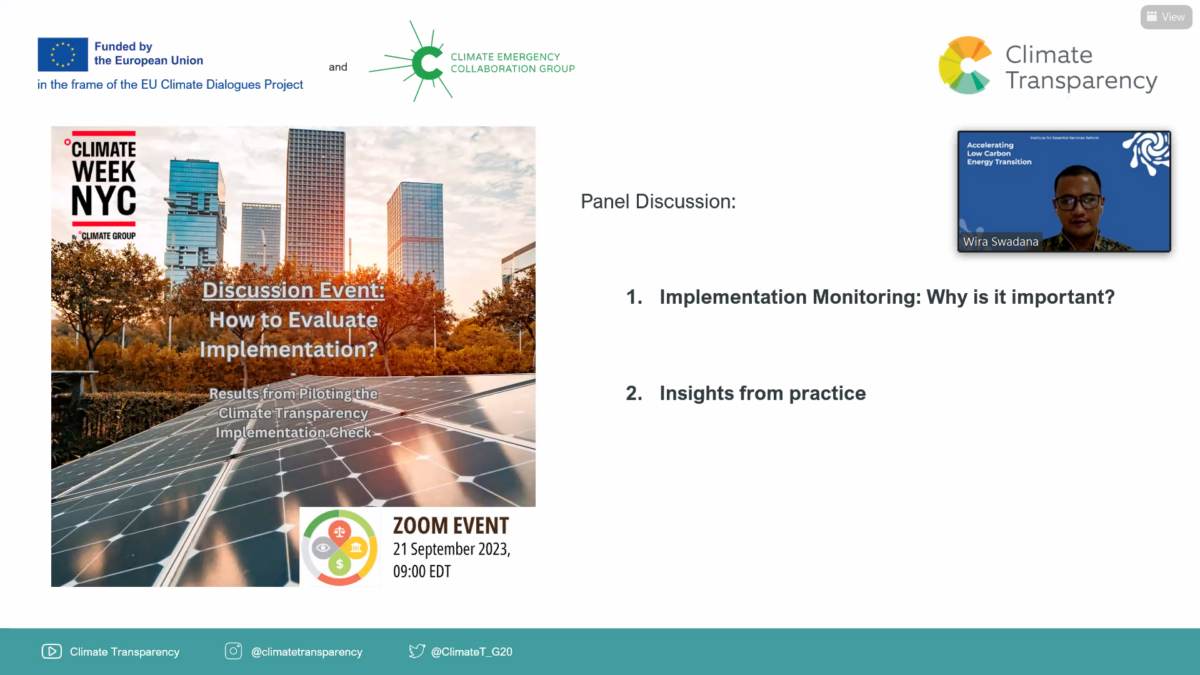New York, 21 September 2023 – The global community is urging global leaders to take serious actions to address climate change. During the COP 27 in Egypt, several countries renewed their commitment to reducing greenhouse gas emissions and achieving net zero emission status. However, there are still gaps between commitment and implementation of policy and action to seize the determined target.
To assess, rate, and monitor a country’s progress during the policy implementation, Climate Transparency, a global partnership of research organizations and NGO in the G20 countries, has developed a methodology to review policy implementation across four categories: legal status, institutions & governance, resourcing, and oversight.
Yvonne Deng, Energy and Climate Strategy Expert from the 7Gen Consulting, emphasized the importance of having monitoring instruments to review current policy and its role to seize the climate target.
“We (Climate Transparency) analyze the gap and go deeper to the sectoral approach to recommend what sectoral policy a country should take to pursue the ambition,” said Yvonne.
South Africa, one of the countries receiving global attention lately as the first recipient of Just Energy Transition Partnership funding. Guy Cunliffe, Energy System Researcher of the University of Cape Town explained that as a country receiving international assistance, South Africa needs to showcase accountability during implementation.
“An implementation monitoring is critical to showcase success of the implementation and as a beneficiary country it is also a way to display progress of the committed project,” he said.
Guy added that as the first JETP recipient, South Africa has increased its climate ambition and tried to integrate significant renewable capacity to its grid. However, during the implementation, the country is experiencing a glitch in terms of electricity supply. This glitch ‘forces’ them to adjust the plan and policy while rapidly changing the energy market. This is only possible with continuous policy monitoring.
Similar to South Africa, Indonesia, as one of the biggest coal producers, has its electricity generation dominated by coal. In 2022, Indonesia renewed its emission reduction target in enhanced NDC, from 29% to 31.89% (unconditional) and 41% to 43.2% (conditional).
Wira Agung Swadana, Green Economy Program Manager at the Institute for Essential Services Reform (IESR), noted that during the transition away from coal-dependency, there are still conflicting interests among stakeholders, primarily due to the government’s lack of clear guidance on the transition’s meaning and direction transition.
“Though Indonesia has increased ambition and target in its NDC, the enabling environment for the renewable energy developers is not attractive enough yet. There is still no clear incentive for the investors as well as the lengthy process,” Wira explained.
The in progress New and Renewable Energy Bill (RUU EBET), though believed to provide a robust policy framework, is to some extent attempting to prolong the use of fossil fuels by including CCS technology in the renewable options.

